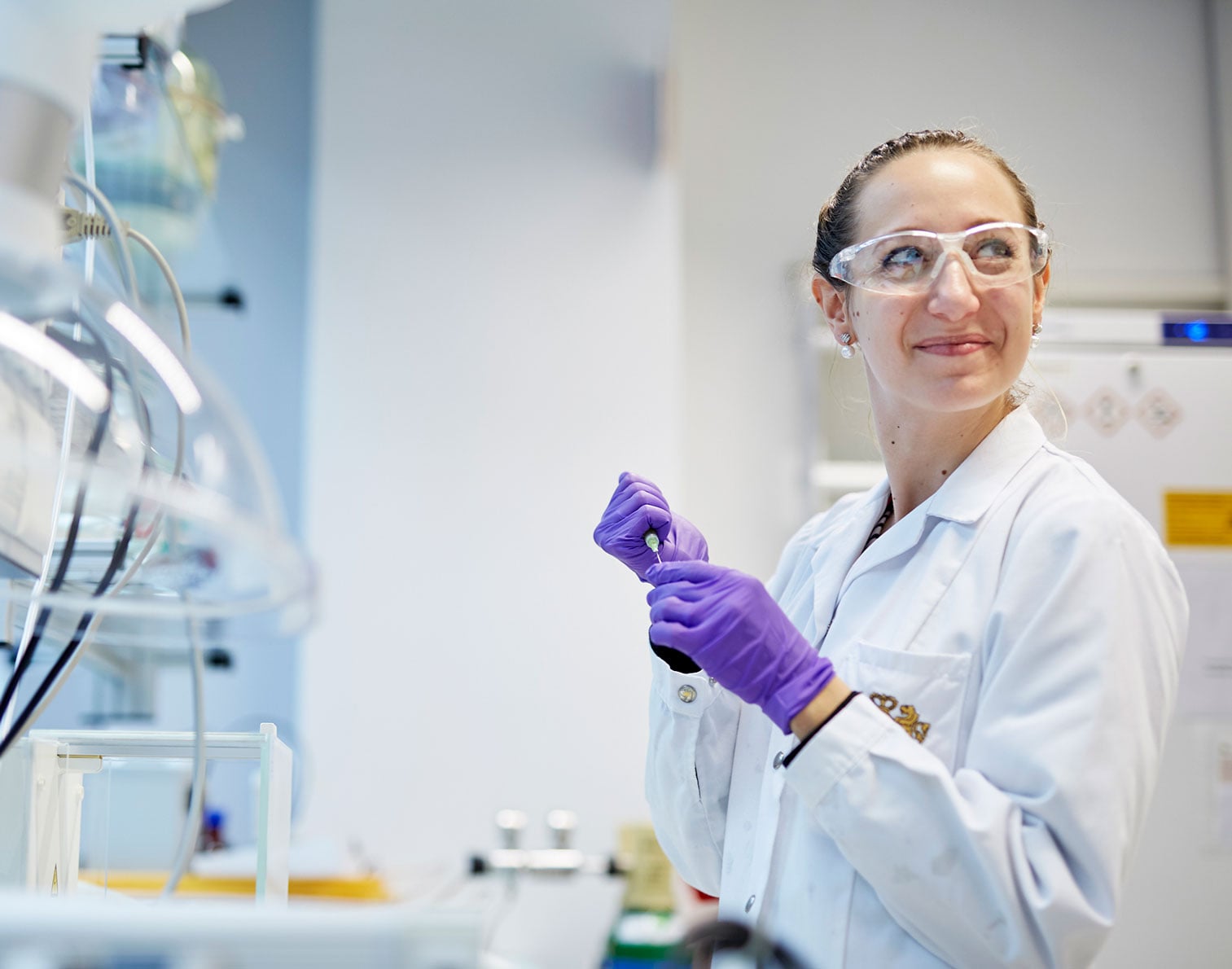As both a committed scientist and someone who wants to contribute to making a positive difference in the world, I’m acutely aware of the importance of being open and robust in our research on better alternatives to cigarettes.
I believe a smoke-free future is within reach. Achieving this would be a significant step forward for global public health.
The science behind PMI’s smoke-free transformation
Any manufacturer of a product
has the obligation to bring data to the table
to show what a product does and what it doesn't do.
Typically, people are surprised
when they see what type of science we do here in Philip Morris.
What we want to understand is how our consumers benefit from our products.
So we start with analyzing what comes out of the product.
So aerosol chemistry and physics.
And then we test that aerosol on in vitro.
So in cell cultures.
And then at that point we start moving into clinical data.
In clinical studies you generate and collect data in a very controlled way.
You bring patients into the study.
You follow them through the study and you collect the data specifically
for the study.
When it comes to real-world evidence studies,
it’s a little bit different because the population is larger.
You use data sources, which are called real-world data sources,
such as electronic records, medical records, health insurance claims, for example.
It's a little bit more representative of what is happening in real life condition.
And this is why they are called that way.
We are taking a very comprehensive approach
in order to understand better our products
and why are they better compared to conventional cigarettes.
That requires a lot of science.
It requires a lot of reports that go to different regulatory bodies.
And all of that really is to provide information to, most importantly,
our consumers, but also to share with the health agencies.
So when they evaluate the approval of our products, they have all the information.
that we have. This is the data that our consumers need.
Developing the science that will help propel Philip Morris International (PMI) toward this ambition has motivated me every day of my 17 years at the company—and continues to.
Letting the science speak for itself
If our publicly shared results don’t support our alternatives to continued smoking, we’d expect these products to be disregarded. But if the science shows they are a better alternative, isn’t it the duty of everyone concerned to sit up and take notice?
We disseminate our data as a direct means of communication with the scientific community and other stakeholders in the wider society. For example, we submit our results to scientific journals which are then evaluated by our scientific peers before being published. We also submit our results to relevant regulatory authorities such as the U.S. Food and Drug Administration (FDA).
And we communicate via scientific presentations at conferences, on our PMI Science website, and in our press releases.
Ensuring robustness in our research
Our robust research is achieved through meticulous adherence to scientific principles and strict quality management systems. Our practices are inspired by the pharmaceutical industry.
We adhere to the principles of stringent international ethical and quality guidelines for clinical research, such as the Good Clinical Practice standards. We collaborate with experienced and reputational Contract Research Organizations who manage the life cycle of the clinical studies (planning, coordination, execution and collection of data, and statistical analyses) safely and efficiently.
The well-being and safety of the participants must be ensured. No clinical study begins without the careful review and approval of the study from an independent Ethics Committee, whose role is to verify that the rights, safety, and well-being of participants are protected.
A commitment to the data integrity of our findings is vital. For instance, the credibility of our data was illustrated when we submitted participant-level clinical data to regulatory bodies such as the FDA, so that they could perform their own independent statistical analyses to verify our results.
In fact, we submitted over a million pages of evidence on our leading heated tobacco product to the FDA. After three years of review, the FDA authorized it with an exposure modification order to be marketed as a modified risk tobacco product with the following information:
- It heats tobacco but does not burn it.
- This significantly reduces the production of harmful and potentially harmful chemicals.
- Scientific studies have shown that switching completely from conventional cigarettes to the heated tobacco product significantly reduces your body’s exposure to harmful or potentially harmful chemicals.
Encouraging independent reviews
Like any other scientists, we seek to test hypotheses, and that requires an intentional and structured approach with the hypothesis and criteria for study success predefined in the protocol. We acknowledge that each study comes with certain limitations.
We encourage peer review and independent replication of our studies, which I strongly believe is fundamental to demonstrate that a harm reduction with smoke-free products can be achieved based on solid scientific evidence. It provides additional validation and helps overcome potential bias due to our industry affiliation.
Ultimately, it’s the robustness of the science that will shape new views and attitudes toward the public health goal my company is focused on.
If our publicly shared results don’t support our alternatives to continued smoking, we’d expect these products to be disregarded. But if the science shows they are a better alternative, isn’t it the duty of everyone concerned to sit up and take notice?
Focus on quality and accountability
Our commitment to quality is evident in our approach to conducting clinical research.
We maintain comprehensive documentation for each study in an electronic archiving system which includes every document necessary to understand retrospectively what has happened in the study from start to finish. This allows for traceability, ensuring that any external auditor or inspector can verify the integrity of our research.
We also conduct regular internal audits to verify or improve our quality management processes. Any deviations from established procedures are thoroughly investigated and corrective actions are implemented if findings are identified to maintain the highest standards of scientific rigor.
Moving forward with purpose
As we continue our research at PMI, we are fostering a scientific environment driven by data integrity and rigorous analysis. I vehemently believe that open, transparent, and robust science is key to answering outdated skepticism and, most importantly, advancing public health.
Our aim is to contribute valuable insights to the field of tobacco harm reduction and the critical role it can play in helping adults that don’t quit tobacco and nicotine completely abandon cigarettes for better alternatives.
Our dedication is unwavering. We are committed to conducting high-quality, ethical research and sharing our findings openly with the scientific community and the public. This approach not only enhances the credibility of our work but also ensures that our research can withstand scrutiny and contribute meaningfully to a better future.





